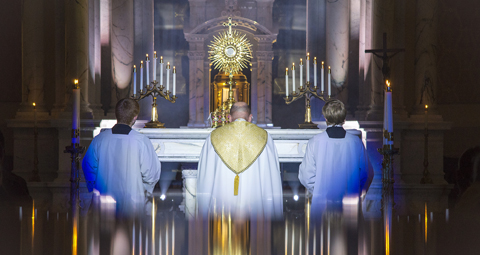May 31 | ![]() 0 COMMENTS
0 COMMENTS ![]() print
print

Parishes can reap a harvest of great fruits from Eucharistic Adoration
— While returning to Mass can be daunting for some, adoration can reach people on stages of a Faith journey, Fr Jamie McMorrin writes.
Like many others across Scotland, the children of our parish are now in the final stages of preparation for their First Holy Communion in the coming weeks.
I must say I find the excitement with which they’re looking forward to the big day rather edifying.
I remember there was a little girl in my previous parish who, in the weeks after her First Communion, would come up to me at the end of Mass and say, eyes wide with excitement, ‘Fr Jamie, that was my seventh Communion!’
Great joy
I’m not sure if she’s still counting, but it was clear that the great joy of receiving our Lord in the Eucharist was still fresh in her mind.
For most of us, though, the excitement of novelty wears off soon enough. The reception of the Body and Blood, Soul and Divinity of our Lord and Saviour becomes, by its regularity, something we can come to take for granted.
Our Faith in the Holy Eucharist, the mystery of the Lord’s Body and Blood made truly present on our altars and in our tabernacles, might weaken with time: we begin to doubt if the Lord is really there, we begin to forget what a tremendous gift the Eucharist is, and we might even begin to ask ourselves what the point is in coming to Mass at all.
Danger to Faith
Familiarity, even if it doesn’t always breed contempt, can be a dangerous thing for our Faith.
If this is true in our own lives, it’s also true in the history of the Church.
There have been periods in the Church’s pilgrimage through history when the Eucharistic Faith that was handed on by the apostles has been denied, or has been mis-represented, or has simply been neglected.
Love for the Eucharist
In the 16th century, the great, reforming Archbishop of Milan, St Charles Borromeo, established the practice of 40 hours of continuous, solemn exposition of the Blessed Sacrament in his diocese to foster a greater love for the Eucharist in the aftermath of the Reformation.
The practice has survived to this day and is still celebrated around this time in parishes throughout the country.
In a few weeks, we’ll celebrate the Forty Hours devotion in our Cathedral in Edinburgh as a way of renewing and refreshing our Faith in the Holy Eucharist, asking the Lord Jesus to pour out his blessings on our parish, on our city and on our country.
Faithful souls
We’re fortunate to have a good number of the faithful souls described by Fr Michael last week who already attend Mass every day and who have already committed to keep watch with the Lord: people who already have a deep Eucharistic Faith and who, like Simeon and Anna in St Luke’s Gospel, seem ‘never to leave the Temple but worship there with fasting and prayer night and day.’ Thanks be to God for them!
We have many others who come to Mass on Sundays, and who are perhaps feeling the Lord calling them to move beyond their comfort zone to the ‘deep waters’ of quiet prayer with him.
We also have people, whose stories I’ll never know, who drift in and out of our church all day long—some are tourists, come to admire the beauty of the cathedral, others come carrying heavy burdens to lay before the Lord and his saints.
Something for everyone
That’s one of the great things about Eucharistic Adoration! There’s something in it for everyone, wherever we are on our journey of Faith.
The American lay evangelist Sherry Weddell says that we ought to think of exposition of the Blessed Sacrament not only as a devotion for the already convinced, but also as a form of evangelisation.
She describes it as the perfect point of access for postmodern people: experiential, non-judgmental and mysterious.
As she says, it’s accessible to everyone: “the non-Baptised, the unchurched, the lapsed, the sceptical, the seeking, the prodigal and those who aren’t sure that a relationship with God is even possible.”
Daunting
As much as I love the Mass and the liturgy, I know it can be daunting to someone who doesn’t know what to say or what to do. At adoration, you can (within reason!) say or do whatever you like. You can say or do nothing, if you prefer.
The Cure d’Ars once famously asked one of his illiterate, peasant parishioners what he did during prayer and received the wonderful response: “I look at Him and He looks at me.”
Of course there are as many ways of praying as there are people who pray. We can pray anywhere: indoors and outdoors, in our bedrooms and in the car.
Presence of Jesus
But, in prayer before the Blessed Sacrament, we enter into the presence of Jesus in a very special way.
Parishes which are able to offer regular, and even continuous, periods of Eucharistic Adoration, often reap a harvest of great fruits: the Lord Jesus is never outdone in generosity.
Whenever we come to adoration with open hands and with open hearts, the Lord always responds with abundance. He’s waiting for us in the Blessed Sacrament: come, let us adore Him










